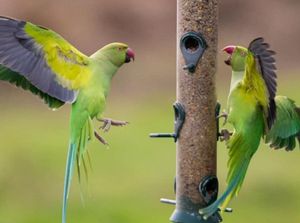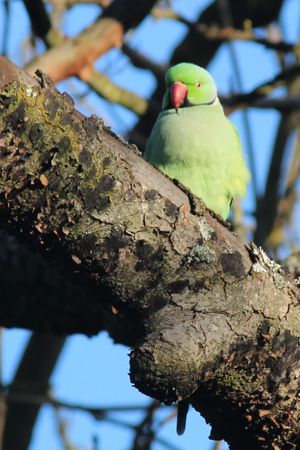Parakeets are squawk of the town as birds take over Black Country parks
Wild parakeets have been spotted in several Black Country green areas as they fight for space, experts have revealed.

The increased sightings have sparked concerns with wildlife experts, who say that the opportunistic green ring-necked parakeet will often fight for homes with native wildlife.
Walkers have been spotting the ever more common birds in several locations around the Black Country, with a large number of sightings in Baggeridge Country Park, Sedgley's Beacon hill, Cotwall End Local Nature Reserve and Walsall Arboretum.
Matt Kirby, owner of Oak Ecology, an ecological survey provider, said: "Parakeets can tend to be quite aggressive, they will fight with other animals for homes, especially woodpeckers, and other tree-dwellers.
"These birds like to nest in holes in wide, tall trees, similar to a lot of other tree-dwelling animals, and they can get territorial, they are very opportunistic, so if the original owners are out of their hole, they may just move in."
The birds have yet to be introduced into the invasive non-native animal species list, however, experts are currently determining the ecological impact of the species.
Matt continued: "They can be quite aggressive and they will try to push other animals out, but they will also compete with other birds for food.
"I think the Government is just checking the numbers at this point, but they breed like rabbits and they are in most English counties, Wales and even up to Scotland and Ireland.
Jacob Williams, senior reserves officer at Birmingham and Black Country Wildlife Trust, told us: "Ring-necked parakeets are not native to the UK and although they are beautiful birds, they are also a powerful and competitive species.
"There are reported concerns that parakeets could be having a detrimental impact on some of our native bird species such as the woodpecker and the nuthatch by occupying cavities for nesting - and the great tit and blue tit by dominating local food sources.
"Researchers are currently studying the potential effect that the increase in parakeet populations may be having on our native wildlife."

The exotic green ring-necked parakeets are becoming a more common sight around the Black Country's green spaces with some cheeky birds even helping themselves to the contents of bird feeders.
David Talbot, 62, of Wolverhampton, said: "I saw one in my back garden not long ago feeding from the bird feeder, it was quite aggressive to the other birds in all fairness, you don't expect that.
"You can absolutely see how they would take over the natural habitats of other animals that are maybe not as aggressive, it is concerning."

The first wild parakeets are thought to have emerged in the 1970s after a large number of the birds escaped captivity, and over the years eventually settled into London's parks.
The parakeets have quickly become one of the UK's most abundant naturalised parrots.
The Birmingham and Black Country Wildlife Trust has asked for help in recording the numbers of wild parakeets by sending sightings to the Local Environment Records Centre.
For more information or to register your find, visit the Wildlife Trust's website bbcwildlife.org.uk/Ecorecord.




